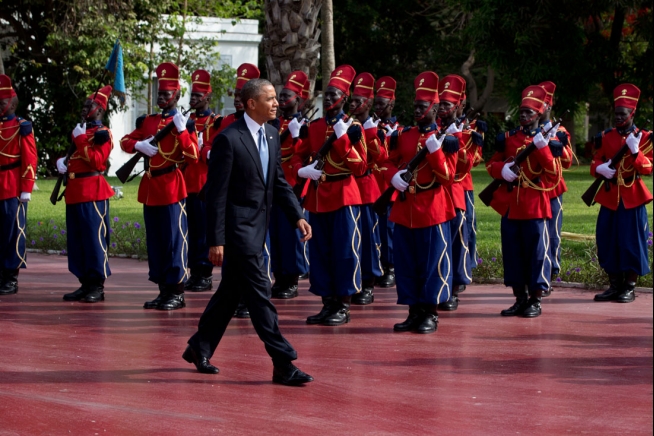Last week, President Obama completed a whirlwind official visit to west, southern and eastern Africa, stopping in Senegal, South Africa and Tanzania, important democratic US partners.
The President announced a number of new initiatives designed to strengthen US–African relations, particularly in economic and development areas, including Trade Africa and Power Africa—the latter of which Sabrina Smith wrote about here last week. Trade Africa is intended to boost trade with and within Africa, starting with the East African Community and the negotiation of a regional investment treaty. This is coupled with the President’s desire to finalise a new trade and investment agreement with the Economic Community of West African States. Also on the trade agenda was the African Growth and Opportunity Act, which expires in 2015 and which the President emphasised in each country of the tour that he would like to see renewed and improved.
Along with these new initiatives, the President announced the establishment of the Washington Fellowship for Young African Leaders, a major expansion of the Young African Leaders Initiative launched in 2010. Beginning in 2014, the fellowship will bring 500 young leaders to US universities and colleges each year to receive training and mentoring in business entrepreneurship, civic leadership and public administration.
Food Security was another recurring topic for the President throughout the tour. He participated in a Feed the Future food security event in Senegal, which will join the New Alliance for Food Security and Nutrition this year and his attendance at the event coincided with the release of a progress report for the program.
While in South Africa, Presidents Obama and Zuma discussed reform of the UN and the Security Council, among many other issues. While stating that updating the UN structure will be difficult, President Obama said that an expansion of the Security Council in which the African continent had no representation would be odd. The Presidential visit underlines the rapid economic growth taking place in many African states and the progress made in improving security on the continent.
Africa’s now selling the message that the continent’s all about business and investment, even though there’re challenges ranging from drug trafficking, land and water conflicts, inadequate access to clean drinking water, corruption, climate change, extremism, and inter- and intra-state rivalries.
These issues, among others, will be the subject of discussions next week at the first Aus-Africa Dialogue. The Dialogue is a partnership between ASPI and the Brenthurst Foundation in South Africa and will explore issues related to growth, jobs, and security beyond the resources boom in both continents, good governance, professional and cultural exchange matters, increasing security cooperation, and aid and increasing people-to-people links.
The Dialogue will examine ways in which the Australian–African relationship can further develop. Africa’s outlook is broadly positive, with much of the continent characterised by stability and economic growth. So the Aus-Africa Dialogue is intended to focus on a shared future of opportunities, rather than dwelling on the challenges.
As Kevin Rudd pointed out in May this year (PDF):
As both a Pacific power and an Indian Ocean power… Australia should never be afraid to look west. We have a gateway to Africa in Perth which has proved itself as a builder of people-to-people links, particularly through our mining sector. We have a steadfast trust and growing friendship with the African nations from our recent expansion of diplomatic relations and engagement in the region. We have significant investments through trade, humanitarian assistance and aid programs in the security and prosperity of the African continent. There is no doubt that the Australian people want Africa to grow and thrive. I am an optimist for how Australia and Africa can work together productively to secure a strong future for our respective peoples. Over the years and decades to come, I look forward to seeing an Australian-African relationship that is closer, deeper and stronger than ever before.
Kristy Bryden is an intern at ASPI and Anthony Bergin is deputy director of ASPI. Image courtesy of The White House.


